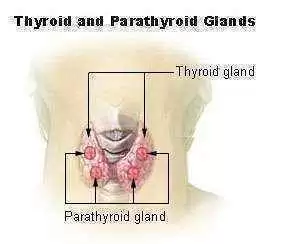Celiac Disease And The Thyroid Gland
 If you have Celiac Disease, it is important that you know a bit about your thyroid gland, as you are at a high risk of autoimmune thyroid disease. Experts estimate that between 8 and 12% of people with Celiac Disease have, or will eventually develop, problems with their thyroid gland. Conversely, between 3 and 5% of people with autoimmune thyroid disease will develop Celiac Disease. I was diagnosed with Hashimoto’s Disease (hypothyroidism) in 2003, seven years before my Celiac diagnosis.
If you have Celiac Disease, it is important that you know a bit about your thyroid gland, as you are at a high risk of autoimmune thyroid disease. Experts estimate that between 8 and 12% of people with Celiac Disease have, or will eventually develop, problems with their thyroid gland. Conversely, between 3 and 5% of people with autoimmune thyroid disease will develop Celiac Disease. I was diagnosed with Hashimoto’s Disease (hypothyroidism) in 2003, seven years before my Celiac diagnosis.
Celiac.com Sponsor (A13):
The thyroid gland is a butterfly-shaped gland that is present in the neck region, just under the region of the “Adam’s apple,” which is made up of two lobes (see diagram).
Our thyroid glands secrete hormones that regulate metabolism, play a role in the growth and development of our bones and muscles, and impact brain and heart function. Thyroid gland dysfunction can lead to a rapid decline in health. Prior to my diagnosis with Hashimoto’s Disease, I had a 4 to 6 month history of overwhelming fatigue, dry skin, puffiness around my eyes, hair thinning, mental sluggishness, and feeling cold all of the time. I was about to scan and put in a photo of myself in the weeks leading up to my diagnosis, but I look so atrocious that I did not want to scare any of you. It is available upon request!
In Hashimoto’s Disease, the body makes auto-antibodies which lead to thyroid inflammation and destruction, which in turn causes the the thyroid to be under-active (also called hypothyroidism). Hashimoto’s is the most common autoimmune thyroid disease that is associated with Celiac Disease. Common symptoms associated with hypothyroidism include lethargy, depression, muscle cramps, constipation, dry skin, cold intolerance, and/or weight gain. The treatment for hypothyroidism is to take synthetic thyroid hormone, which is called levothyroxine. The brand name for levothyroxine is Synthyroid.
If you are started on levothyroxine, it is important to have your thyroid hormone levels checked frequently, so that your dose can be adjusted as needed. Pregnancy, the postpartum period, lactation, menopause, and other events associated with hormonal changes can also effect the thyroid gland, so it is important to have your thyroid hormone levels monitored closely during these times.
Once I went gluten free, my levothyroxine dose decreased from 150 mcg/day to 125 mcg/day. From the reading that I have done, this is not unusual, and many Celiacs experience a need for less thyroid hormone once off of gluten. However, it is very unusual for hypothyroidism to ever totally resolve. This means that if you are diagnosed with Hashimoto’s Disease, you should anticipate being on thyroid hormone replacement therapy for the rest of your life.
A few other things which I have learned about levothyroxine: 1. Make sure to take it on an empty stomach (I take mine first thing in the morning, about 30 to 45 minutes before breakfast), 2. To take separately from vitamin and mineral supplements, as some can interfere with its absorption, and 3. Make sure that the levothyroxine which you are taking is gluten free. I have been taking generic levothyroxine manufactured by Lannett since October 2012 without any issues. www.glutenfreedrugs.com is a great resource to check out the gluten-free status of drugs and supplements.
Grave’s Disease is the most common cause of hyperthyroidism, or overactive thyroid. In this disease, auto-antibodies stimulate the thyroid gland to produce an excess of hormones. Hyperthyroid symptoms are the opposite of those seen in Hashimoto’s Disease and include weight loss, elevated body temperature, irritability, tremors, heart palpitations, and insomnia. Treatment options for Grave’s Disease include antithyroid medications, radioactive iodine, and surgery. For more on Grave’s Disease, please see the following link (taken from the womenshealth.gov website).
The main test used to screen for thyroid problems and monitor thyroid function is called a TSH (short for thyroid stimulating hormone). In hypothyroidism, the TSH is too high, and in hyperthyroidism, the TSH is too low. In most cases test results should be available within 24 hours of having blood drawn. T4 and T3 levels are also monitored closely during diagnosis and treatment.
My hypothyroid symptoms improved dramatically within one week of starting on Synthroid after my diagnosis with Hashimoto’s Disease. I urge you to have your TSH checked if you or a loved one are experiencing any unusual symptoms which may be due to thyroid dysfunction.
The bottom line is that if you have Celiac Disease, you need to have your thyroid function monitored, and if you have autoimmune thyroid disease, you should strongly consider being screened for Celiac Disease, especially if any concerning symptoms develop.
For more information, please check out the following links:
1. Celiac Disease and Autoimmune Thyroid Disease. Ch’ng, C., et al. Clin Med Res. 2007; 5(3): 184-192.
2. “Celiac Disease, Thyroid Disease Often Found Together. Two Autoimmune Disorders Could Share Common Trigger.” By Jane Anderson, About.com Guide; updated January 19, 2012.
3. “Celiac and the Thyroid.” NFCA website: www.celiaccentral.org. Accessed 04/23/2013.
4. Prevalence of thyroid disorders in untreated adult celiac disease patients and effect of gluten withdrawal: an Italian multicenter study. Sategna-Guidetti C, Volta U, Ciacci C, Usai P, Carlino A, De Franceschi L, Camera A, Pelli A, Brossa C. Am J Gastroenterol. 2001 Mar; 96(3):751-7. See link.



0 Comments
Recommended Comments
There are no comments to display.
Create an account or sign in to comment
You need to be a member in order to leave a comment
Create an account
Sign up for a new account in our community. It's easy!
Register a new accountSign in
Already have an account? Sign in here.
Sign In Now